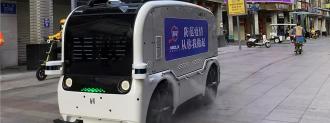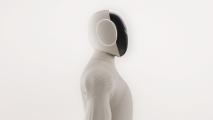A delivery robot has proven to be an instrumental — and versatile — weapon in China’s fight against the novel coronavirus.
Because of the coronavirus outbreak, millions of people are now quarantined in their homes, avoiding potentially infectious public spaces at all costs. Medical staff, meanwhile, are packed into hospitals, overworked and at high-risk of catching the disease they’re struggling to treat.
The situation is unlike anything we’ve ever seen before — and it’s provided Chinese company Neolix’s delivery robot with an opportunity to step up.
The Multi-Talented Delivery Robot
Neolix’s boxy, battery-powered delivery robot costs about $30,000. Based on the company’s website, its intended uses include serving as a mobile vending machine and patrolling neighborhoods as a 24/7 security guard.
Since the beginning of the coronavirus outbreak, however, the delivery robot has tackled a number of new tasks: transporting medical supplies to hospitals, bringing food to people working to fight the virus, and spraying disinfectant on streets.
“These robots are pioneers in delivering vital supplies and food to people who’ve been infected.”
David Chen
These contributions to the coronavirus response effort have led to a surge in demand for Neolix’s delivery robot.
In the past two months, the company has received more than 200 orders, company founder Yu Enyuan told Bloomberg, and it expects to sell 1,000 before the end of the year. Prior to the coronavirus outbreak, Neolix had produced just 125 of the autonomous bots.
Yu doesn’t think this new appreciation for delivery robots will end when the outbreak does, either.
“(P)eople’s perception toward driverless delivery had a complete 180-degree shift,” he told Bloomberg. “People realize that such vehicles can get things done when it is risky for a human being to do so.”
Coronavirus Outbreak Responders
Neolix’s hasn’t been the only delivery robot helping during the coronavirus outbreak.
In January, food delivery service Ele.me began using a delivery robot developed by Alibaba to carry meals to quarantined people in a hotel in Wenzhou, China. Another delivery robot dubbed “Little Peanut” served the same purpose at a hotel in Hangzhou.
The following month, delivery app Meituan Dianping began using its own delivery robot to transport grocery orders to customers in China, limiting any potential contact with infected people.
At one temporary coronavirus hospital in Wuhan, three different types of robots — including a food delivery robot — took care of patients so that hospital staff wouldn’t have to come in contact with them.
U.S.-based camera sensor manufacturer Orbbec co-developed the hospital robots with several other organizations. According to company co-founder David Chen, the coronavirus crisis is showing just how valuable delivery robots can be during an outbreak.
“(O)ne of the most effective ways to reduce the dangers of a contagion is by limiting contact with others,” he told Digital Trends. “These robots are pioneers in delivering vital supplies and food to people who’ve been infected.”






